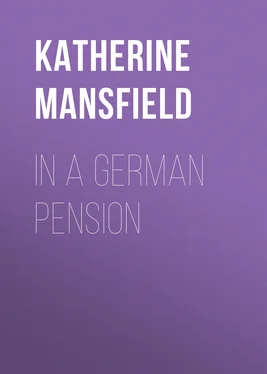Katherine Mansfield - In a German Pension
Здесь есть возможность читать онлайн «Katherine Mansfield - In a German Pension» — ознакомительный отрывок электронной книги совершенно бесплатно, а после прочтения отрывка купить полную версию. В некоторых случаях можно слушать аудио, скачать через торрент в формате fb2 и присутствует краткое содержание. Жанр: foreign_prose, foreign_antique, на английском языке. Описание произведения, (предисловие) а так же отзывы посетителей доступны на портале библиотеки ЛибКат.
- Название:In a German Pension
- Автор:
- Жанр:
- Год:неизвестен
- ISBN:нет данных
- Рейтинг книги:4 / 5. Голосов: 1
-
Избранное:Добавить в избранное
- Отзывы:
-
Ваша оценка:
- 80
- 1
- 2
- 3
- 4
- 5
In a German Pension: краткое содержание, описание и аннотация
Предлагаем к чтению аннотацию, описание, краткое содержание или предисловие (зависит от того, что написал сам автор книги «In a German Pension»). Если вы не нашли необходимую информацию о книге — напишите в комментариях, мы постараемся отыскать её.
In a German Pension — читать онлайн ознакомительный отрывок
Ниже представлен текст книги, разбитый по страницам. Система сохранения места последней прочитанной страницы, позволяет с удобством читать онлайн бесплатно книгу «In a German Pension», без необходимости каждый раз заново искать на чём Вы остановились. Поставьте закладку, и сможете в любой момент перейти на страницу, на которой закончили чтение.
Интервал:
Закладка:
Katherine Mansfield
In a German Pension
1. GERMANS AT MEAT
Bread soup was placed upon the table.
“Ah,” said the Herr Rat, leaning upon the table as he peered into the tureen, “that is what I need. My ‘magen’ has not been in order for several days. Bread soup, and just the right consistency. I am a good cook myself”—he turned to me.
“How interesting,” I said, attempting to infuse just the right amount of enthusiasm into my voice.
“Oh yes—when one is not married it is necessary. As for me, I have had all I wanted from women without marriage.” He tucked his napkin into his collar and blew upon his soup as he spoke. “Now at nine o’clock I make myself an English breakfast, but not much. Four slices of bread, two eggs, two slices of cold ham, one plate of soup, two cups of tea—that is nothing to you.”
He asserted the fact so vehemently that I had not the courage to refute it.
All eyes were suddenly turned upon me. I felt I was bearing the burden of the nation’s preposterous breakfast—I who drank a cup of coffee while buttoning my blouse in the morning.
“Nothing at all,” cried Herr Hoffmann from Berlin. “Ach, when I was in England in the morning I used to eat.”
He turned up his eyes and his moustache, wiping the soup drippings from his coat and waistcoat.
“Do they really eat so much?” asked Fräulein Stiegelauer. “Soup and baker’s bread and pig’s flesh, and tea and coffee and stewed fruit, and honey and eggs, and cold fish and kidneys, and hot fish and liver? All the ladies eat, too, especially the ladies.”
“Certainly. I myself have noticed it, when I was living in a hotel in Leicester Square,” cried the Herr Rat. “It was a good hotel, but they could not make tea—now—”
“Ah, that’s one thing I can do,” said I, laughing brightly. “I can make very good tea. The great secret is to warm the teapot.”
“Warm the teapot,” interrupted the Herr Rat, pushing away his soup plate. “What do you warm the teapot for? Ha! ha! that’s very good! One does not eat the teapot, I suppose?”
He fixed his cold blue eyes upon me with an expression which suggested a thousand premeditated invasions.
“So that is the great secret of your English tea? All you do is to warm the teapot.”
I wanted to say that was only the preliminary canter, but could not translate it, and so was silent.
The servant brought in veal, with “sauerkraut” and potatoes.
“I eat sauerkraut with great pleasure,” said the Traveller from North Germany, “but now I have eaten so much of it that I cannot retain it. I am immediately forced to—”
“A beautiful day,” I cried, turning to Fräulein Stiegelauer. “Did you get up early?”
“At five o’clock I walked for ten minutes in the wet grass. Again in bed. At half-past five I fell asleep, and woke at seven, when I made an ‘overbody’ washing! Again in bed. At eight o’clock I had a cold-water poultice, and at half past eight I drank a cup of mint tea. At nine I drank some malt coffee, and began my ‘cure.’ Pass me the sauerkraut, please. You do not eat it?”
“No, thank you. I still find it a little strong.”
“Is it true,” asked the Widow, picking her teeth with a hairpin as she spoke, “that you are a vegetarian?”
“Why, yes; I have not eaten meat for three years.”
“Im—possible! Have you any family?”
“No.”
“There now, you see, that’s what you’re coming to! Who ever heard of having children upon vegetables? It is not possible. But you never have large families in England now; I suppose you are too busy with your suffragetting. Now I have had nine children, and they are all alive, thank God. Fine, healthy babies—though after the first one was born I had to—”
“How wonderful! ” I cried.
“Wonderful,” said the Widow contemptuously, replacing the hairpin in the knob which was balanced on the top of her head. “Not at all! A friend of mine had four at the same time. Her husband was so pleased he gave a supper-party and had them placed on the table. Of course she was very proud.”
“Germany,” boomed the Traveller, biting round a potato which he had speared with his knife, “is the home of the Family.”
Followed an appreciative silence.
The dishes were changed for beef, red currants and spinach. They wiped their forks upon black bread and started again.
“How long are you remaining here?” asked the Herr Rat.
“I do not know exactly. I must be back in London in September.”
“Of course you will visit München?”
“I am afraid I shall not have time. You see, it is important not to break into my ‘cure.’”
“But you must go to München. You have not seen Germany if you have not been to München. All the Exhibitions, all the Art and Soul life of Germany are in München. There is the Wagner Festival in August, and Mozart and a Japanese collection of pictures—and there is the beer! You do not know what good beer is until you have been to München. Why, I see fine ladies every afternoon, but fine ladies, I tell you, drinking glasses so high.” He measured a good washstand pitcher in height, and I smiled.
“If I drink a great deal of München beer I sweat so,” said Herr Hoffmann. “When I am here, in the fields or before my baths, I sweat, but I enjoy it; but in the town it is not at all the same thing.”
Prompted by the thought, he wiped his neck and face with his dinner napkin and carefully cleaned his ears.
A glass dish of stewed apricots was placed upon the table.
“Ah, fruit!” said Fräulein Stiegelauer, “that is so necessary to health. The doctor told me this morning that the more fruit I could eat the better.”
She very obviously followed the advice.
Said the Traveller: “I suppose you are frightened of an invasion, too, eh? Oh, that’s good. I’ve been reading all about your English play in a newspaper. Did you see it?”
“Yes.” I sat upright. “I assure you we are not afraid.”
“Well, then, you ought to be,” said the Herr Rat. “You have got no army at all—a few little boys with their veins full of nicotine poisoning.”
“Don’t be afraid,” Herr Hoffmann said. “We don’t want England. If we did we would have had her long ago. We really do not want you.”
He waved his spoon airily, looking across at me as though I were a little child whom he would keep or dismiss as he pleased.
“We certainly do not want Germany,” I said.
“This morning I took a half bath. Then this afternoon I must take a knee bath and an arm bath,” volunteered the Herr Rat; “then I do my exercises for an hour, and my work is over. A glass of wine and a couple of rolls with some sardines—”
They were handed cherry cake with whipped cream.
“What is your husband’s favourite meat?” asked the Widow.
“I really do not know,” I answered.
“You really do not know? How long have you been married?”
“Three years.”
“But you cannot be in earnest! You would not have kept house as his wife for a week without knowing that fact.”
“I really never asked him; he is not at all particular about his food.”
A pause. They all looked at me, shaking their heads, their mouths full of cherry stones.
“No wonder there is a repetition in England of that dreadful state of things in Paris,” said the Widow, folding her dinner napkin. “How can a woman expect to keep her husband if she does not know his favourite food after three years?”
“Mahlzeit!”
“Mahlzeit!”
I closed the door after me.
2. THE BARON
“Who is he?” I said. “And why does he sit always alone, with his back to us, too?”
Читать дальшеИнтервал:
Закладка:
Похожие книги на «In a German Pension»
Представляем Вашему вниманию похожие книги на «In a German Pension» списком для выбора. Мы отобрали схожую по названию и смыслу литературу в надежде предоставить читателям больше вариантов отыскать новые, интересные, ещё непрочитанные произведения.
Обсуждение, отзывы о книге «In a German Pension» и просто собственные мнения читателей. Оставьте ваши комментарии, напишите, что Вы думаете о произведении, его смысле или главных героях. Укажите что конкретно понравилось, а что нет, и почему Вы так считаете.












